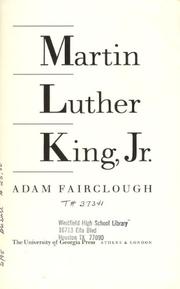

MARTIN LUTHER KING, JR.
A Brief Biography
by Adam Fairclough
A short, readable biography that sticks to King's public career and legacy. Fairclough, (History/Univ. of Wales, Lampeter; To Redeem the Soul of America, 1987) synthesizes material from the rich lode of King scholarship. He describes King's intellectual formation at Morehouse College and Crozer Theological Seminary, his public emergence during the 195556 Montgomery bus boycott, and his subsequent surge to civil rights leadership. The author explores King's philosophy of nonviolence, contrasting his nonpartisan reformism with the ideas of older black leaders like Paul Robeson and W.E.B. DuBois, whose leftist sympathies made them victims of anticommunist fervor. Fairclough analyzes King's historic speech during the 1963 March on Washington, noting his use of ``hallowed symbols of Americanism'' to frame his call for social change. When King moved his protests north to cities like Chicago, he recognized that his incremental political victories had little effect on black poverty; in 1966 he began a more radical critique of American society, and the Vietnam War. Fairclough stumbles a few times. He states that allegations about King's sexual promiscuity ``are still confined to the realm of innuendo''; King colleague Ralph Abernathy's recent memoir supplies stronger evidence. Also, the author, commenting on Malcolm X, states that ``the earlier, angrier Malcolm...would be remembered and revered''; Malcolm's image is now under more subtle scrutiny. But Fairclough offers a savvy summary on King's legacy. Annual King Day celebrations, he writes, ``are too often tedious and empty rituals,'' and the ``I Have a Dream'' speech glosses over King's radicalism and militancy. While the author acknowledges that King was no original thinker, he believes that King's genius was his public speaking, his ``religious enthusiasm and moral certainty.'' And while some observers think King could not have staved off the decline of the civil rights movement, the author suggests that his leadership might indeed have achieved more. A good introduction for those too busy to read the more monumental King biographies.